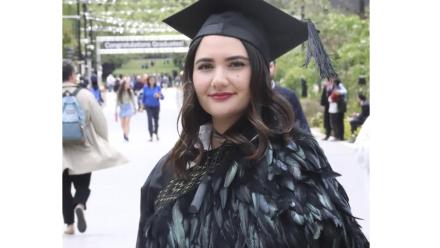One lesson in grade 10 inspired Jessen’s choice of major
Jessen Catalano was inspired to pursue a history major following a particularly moving lesson in high school.
He is graduating this week with aBachelor of Arts from the ANU College of Arts and Social Sciences.We spoke to him about his time at ANU and how he navigated the unique challenge of distance learning through the height of COVID restrictions.
What did you study at ANU?
My undergraduate studies at ANUencompassed aBachelor of Arts, majoring in History, accompanied by two minors in European History and Asian Studies.
Why did you choose this degree?
The decision to pursue such a degree materialised during my time at high school. Although 'history' has attracted my curiosity from an early age - primarily ancient civilisations - I initially aimed toward a future within the sciences. Reflecting childhood interests, a career in physics or chemistry appeared most plausible and desirable. By grade 10, however, an encounter with an enthusiastic teacher radically transformed my direction and priorities. To this day, I can vividly recall Dr Brian Glover's introductory lesson exploring the Bolshevik Revolution and the ascension of Nazism. Hereon, my passion for the past ignited most intensely, and continues to persevere. Witnessing the Brexit referendum and American presidential election of 2016, via my school's library TV, cemented my fascination. Accordingly, I sought tertiary education that provided intensified engagement with history and all facets therein. Exploring pathways to facilitate such, it became evident that a Bachelor of Arts did not merely provide historical exposure, but also great flexibility: imbuing students with invaluable characteristics, inclusive of critical reasoning, effective communication, and adaptability.
Hailing from a small farming community in regional North Queensland, the prospect of enrolling at ANU was non-existent at first. That is, self-doubt sabotaged my confidence to attend an institution with outstanding domestic and international repute. Geography also imparted an influence, where the distance from home - both tangible and psychological - caused additional erosion. Nevertheless, the humanities program at ANU was far too irresistible to dismiss, nor could I ignore the incredible encouragement and support of my parents, for which I will be eternally grateful. Guided by exceptional and considerate scholars, my studies would span a diverse array of themes, and the employment of various analytical perspectives. Due to the sheer range of courses offered, spanning the entirety of the world, it was possible to not only focus upon key interests, such as conflict, empire, and ideology, but also complementary topics of economics, international relations, and environmentalism, among several others. For myself, university education was never about the final certificate, but maturation and the absorption of qualitative knowledge and skills.
What has been the biggest takeaway/learning from your degree?
Upon reflection of my undergraduate years, there are various conclusions I can identify, from the obscure to the unambiguous. In totality, the greatest 'takeaway' was the complex existence of history itself - its origins, evolution, cultural variation, and societal significance. Indeed, history does involve the chronicling of the past: dates, locations, actors, etc. However, history simultaneously constitutes the study of change, from the nature of human civilisation to the environment in which it inhabits. Notwithstanding limitations, historians - equipped with questions and analytical frameworks - adeptly reconstruct human experiences of yesteryear. In doing so, we can uncover the profound variation of ideas and institutions across time and space, and the struggles that materialised between peoples as they occupied a shared and finite world. Nevertheless, historical research does not merely offer vital insights to the present - a phrase often rendered a cliché - but to decipher the fabric that binds the collective narrative together, be it a local or international scale. In my verdict, history does not merely function as an identifier of continuity, but a tool to discern and distinguish, to critique proposed patterns where none may have existed. History, both as an experience and scholarly domain, equally presents an unparalleled opportunity to nurture empathy in a world beset by intolerance, misunderstanding and violence, despite genuine progression. Regrettably, the inverse potential of history - a subjective weapon to promote insularity, exceptionalism and retrospective or lived validation of certain actions or beliefs - has often prevailed. Consequently, history, through cooperation with other fields of study, has arguably acquired ever greater importance to confront the crises that beset our planet.
What have been some challenges that you have overcome during your degree? Particularly remote learning in Far North Queensland?
The journey to complete my undergraduate degree was undoubtedly tumultuous and required significant adjustment (a fate widely shared). Having relocated to Canberra in the middle of February 2020, the pandemic ultimately saw my return to North Queensland within five weeks. Whilst I had concerns regarding the initial reports of COVID-19 - often shrouded in uncertainty - my lecturer's announcement that future participation would no longer be in-person brought the terrifying expectation into reality. From the juncture in late March, my university 'experience' has largely been absent, relegated to remote study almost exclusively. Beyond difficulties in researching, due to the inaccessibility of physical resources, the social element had been debilitating, as my engagement with fellow students was confined to Zoom tutorials (which were often sparse in participation). Having returned to Canberra mid-2022, I must confess that I felt akin to a first-year student, disorientated and isolated. Poor family health, and the responsibility to provide care, also created difficulties in balancing university and other responsibilities. Despite such challenges, I must express my appreciation for the material and support provided by my lecturers. Whether a Zoom meeting or email, each were extremely accommodating, and provided light in a time of seemingly endless darkness.
What is next for you?
Having secured a supervisor - whom I must thank once more - I shall be commencing my honours in 2023. Whilst not without anxiety, I eagerly await the opportunity to explore a topic pertaining to Fascist expansionism and diaspora communities. I hope the resumption of my studies will finally grant me an opportunity to experience a relatively normal year at university, to immerse myself in an atmosphere of academia and to develop social networks. I equally anticipate greater engagement with countries that pique my historical interests, chiefly Italy and Japan, alongside the United States, Germany and Sweden.


